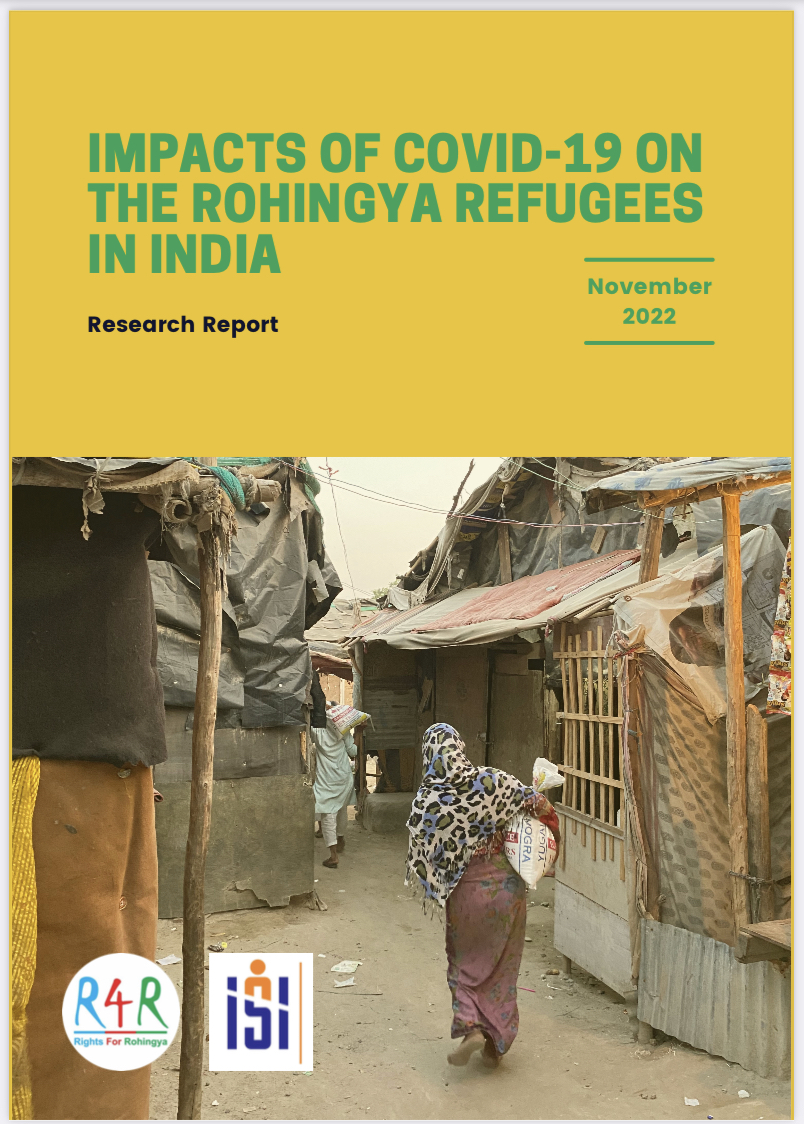Prepared by Rohingya Human Rights Initiative New Delhi, India
Published: November, 2022
EXECUTIVE SUMMARY: The aim of this research report is to provide a picture of lives of the Rohingya refugees in India during COVID-19 and to provide recommendations to alleviate their suffering, in general, and in the time of crisis, in particular. It has covered all the major states in India where the Rohingya refugees live, including NCT Delhi, Haryana, Uttar Pradesh, Jammu, Punjab and Telangana. It documents everyday aspects of life, such as livelihood, health, gender-based violence, WASH and hygiene, and children’s education. Representing a mixed methods approach, this report draws from both qualitative and quantitative methods of data collection.
Our team has conducted 18 in-depth interviews, surveyed 152 community leaders and members across India, and consulted extensive secondary literature and related media reports. The report also highlights how various government bodies, domestic and international agencies, and refugee-led organisations responded to the needs of refugees during the pandemic, especially the Rohingya people. It will be a useful resource for refugee rights workers and activists, community organisations, national and international refugee organisations, and civil society organisations to advocate for the Rohingya refugees and render services and assistance efficiently
RECOMMENDATIONS
RECOMMENDATIONS FOR THE HOST GOVERNMENT
• Need to recognise the refugee status of Rohingya refugees The government of India needs to have an inclusive policy towards the Rohingya refugees by recognising their refugee status and allowing access to certain fundamental human rights, such as right to shelter, education, employment, as per national and international laws. Though India is not a signatory to the 1951 UN Convention on Refugees and its 1967 protocol it has an obligation to provide access to refugees to fundamental human rights as per the Universal Declaration of Human Rights, and international customary law (non-refoulement).
• Granting health services to Rohingya refugees The basic medical treatment for the Rohingya refugees must be easily accessible; in such a case, the government of India needs to recognise the validity of the UNHCR refugee card for accessing medical treatment.
• Stopping arbitrary detention and deportation The Indian government should immediately cease the policy of detaining and deporting Rohingya refugees. Refugees officially registered with the UNHCR should not be arbitrarily detained and deported on the basis of irregular entry and should Rohingya Human Rights Initiative (ROHRIngya) 58 be provided with means to have basic living and access to income to support themselves and their families. Policies of arbitrary detention and deportation have had severe impacts on the community’s collective well-being.
RECOMMENDATIONS FOR UNHCR
• Improve coordination with refugee-led organisations in pandemic assistance. Working with Rohingya organisations, such as R4R, can expand the reach of assistance in times of crisis, and can act as a bridge between donors, implementors and the refugee community.
• Expand mental health support services for refugees. Few Rohingyas had access to professional mental health services during the pandemic, despite rising mental health challenges. UNHCR should expand the provision of these services, and raise awareness among refugees about how to access them.
RECOMMENDATION FOR INDIAN CIVIL SOCIETY
• Campaigning for facilitating formal education for Rohingya children Access to formal education is an issue that determines the very future of the community. A formal education can help Rohingya refugee children learn skills and access livelihoods that break the intergenerational cycle of poverty and contribute to the host country as well. Refugee rights organisations and activists should carry out a campaign to convince the government to facilitate this right to education for Rohingya children.
ACKNOWLEDGEMENTS: Our sincere thanks and respect to all the research interns and volunteers for cooperation throughout the research. They have contributed to completing the report by providing valuable comments and suggestions while developing the concept and design for the study and assisting in carrying out the in-depth interview and writing parts of the report. We express our gratitude to the refugee volunteers who completed the qualitative survey. Cooperation extended by the Rohingya refugees through their participation in indepth interviews and the survey is highly appreciated. The names of all participants names have been changed for the purpose of this report to protect their privacy. We also thank our Advocacy and Research Coordinator (Voluntary), who wishes to be anonymous, for leading the research team.
RESEARCH ASSISTED, COORDINATED AND WRITTEN BY: Sabber Kyaw Min, Riya Singh Rathore, Abesh Dasgupta, Ankita Tandon, Kafi Mahmud, Prachi Tiwari, Rohini Mitra, Jafarullah and others who wished to be anonymous.
DESIGN BY: Erika Dvorakova
PHOTOGRAPHY BY: Ali Johar
REVIEWED BY: Ali Johar, Dr. Jessica Field, Erika Dvorakova & Institute Statelessness and Inclusion (ISI)

